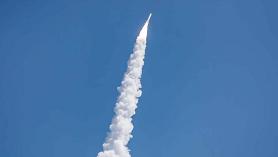JIUQUAN, July 26 (Xinhua) -- A carrier rocket developed by a Chinese private company successfully sent two satellites into orbit from the Jiuquan Satellite Launch Center in northwest China at 1:00 p.m. on Thursday.
The SQX-1 Y1, developed by a Beijing-based private rocket developer i-Space, is a four-stage small commercial carrier rocket.
The rocket's body has a maximum diameter of 1.4 meters, length of 20.8 meters and takeoff weight of 31 tonnes. It has a lift capability of sending 260 kg of payload to 500 km high sun-synchronous orbit.
It marks the first successful orbital launch by a private Chinese firm.
Cai Jingqi, vice president of i-Space, said the successful launch shows that the company has fully grasped the related core technologies in carrier rockets.
Zhang Xiaomin from the School of Aerospace Engineering, Beijing Institute of Technology, said the orbital launch is a milestone in demonstrating that China's privately developed carrier rockets are capable of delivering payloads into space.
In recent years, Chinese private space companies have marched into a field long dominated by state-owned giants. A market report showed that China had seen over 100 registered private companies in the commercial space industry by the end of 2018.
The rapid growth has been possible thanks to the government's efforts to foster the commercial space sector and encourage participation from private companies.
Inspired by the legendary U.S. private space company SpaceX, i-Space, set up in 2016, has become a rising star in the country's space arena.
Last year, a suborbital rocket named the Hyperbola-1S, developed by the company, was successfully launched from a launch center in south China's Hainan Province.
I-Space is among 20-plus commercial space enterprises based in the Beijing Economic and Technological Development Zone or E-town. These newcomers mainly focus on the research, development and design of rockets and satellites for commercial use.
In the past, the aerospace industry mainly served the national strategic goals, but now private space enterprises are exploring how to serve the general public.
"The commercial space industry has gathered momentum in recent years," said Wu Zhijian, director-general of the China Space Foundation, who also added that the global space economy exceeded 400 billion U.S. dollars last year, driven primarily by the commercial space sector.
"State-owned firms are mainly responsible for the country's major space missions. But with economic progress, great demand for commercial space products and services are yet to be fulfilled. Private firms can fill the gap," said Lan Lidong, founder of ZeroG Lab, a Beijing-based developer of micro-and nanosatellites and components.
Lan set up the company in 2017 when he saw the potential in the space industry for private companies. At present, the firm is building a remote sensing satellite network which will obtain real-time Earth observation data for port management, water pollution control, disaster assessment and relief and more.
Xie Fang, vice president of i-Space, said private space companies can help lower costs and increase the efficiency of space activities, accelerating technological development.
"A group of scientists who were former state-owned aerospace industry experts are now working for private firms, adopting a more flexible way to explore space," Cai said.
"In the future, we will continue upgrading our business mode, pushing forward China's commercial space products and services to the world," Cai added.




 A single purchase
A single purchase









